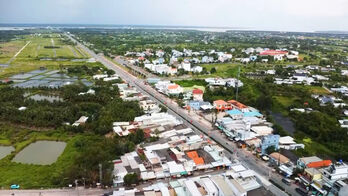Master plan targets long-term prosperity for Mekong Delta
The recently-approved master plan for the Mekong Delta region in the 2021-2030 period with a vision to 2050 is expected to create new values and changes towards sustainable and green growth, and long-term prosperity for the region.
-
 Infrastructure investment to improve the landscape of poor rural areas
Infrastructure investment to improve the landscape of poor rural areas
- Khanh Hoa accelerates preparations for nuclear power plant projects
- Nearly 1.39 trillion VND registered as relief aid for flood victims via central relief committee
- ASEAN, China strengthen joint efforts to combat cross-border cybercrime
- Consolidating and promoting the strength of national solidarity
- First kidney transplants from brain-dead donor performed in Mekong Delta
- HCM City to break ground on 1.8-billion-USD Metro Line 2 in early 2026
- Vietnam to pilot online tax declaration portal this month ahead of 2026 rollout
- For a plastic-waste-free environment
- Vietnam to develop a world-class Olympic sports urban area

.jpg)
.jpg)

